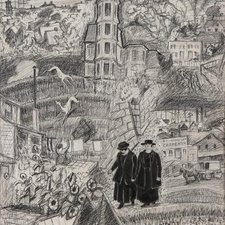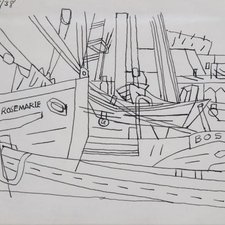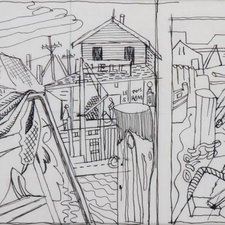Stuart Davis
1892 - 1964
In 1915, John Sloan invited Stuart Davis to join him in Gloucester for a summer of painting. Davis recognized it as "the place I had been looking for" and returned for many summers through 1934. He loved Gloucester's light, topography, the shapes and activity on its docks, and especially its schooners.
Davis drew and wrote constantly, filling sketchbooks and journals. He came to see painting and drawing as the same process, prompting him to say, "The act of drawing is the Content of Art." In his first year of plein air painting in Gloucester, he also discovered that drawing was practical:
I wandered over the rocks, moors and docks, with a sketching easel, large canvases, and a pack on my back, looking for things to paint. After a number of years the idea began to dawn on me that packing and unpacking all this junk ... was irrelevant to my purpose. Following this revelation my daily sorties were unencumbered except by a small sketchbook and ... pen.
—Stuart Davis, quoted in Stuart Davis, American Artist's Group, New York, 1945
Davis' Gloucester work established him as an integral part of the development of American Modernism. He had already been influenced by his New York teacher Robert Henri who was one of the first American artists to concentrate on painting everyday life and its tumult. But it was in Gloucester that he explored his own ideas ... depicting in one piece diverse views and memories of what he had seen and working on the Cubist goal of showing space and time simultaneously.
After 1934, Davis' visits were less frequent, but he never left Cape Ann completely behind, continuing throughout his life to reinterpret the work he did here and to build on the theories he developed here.


